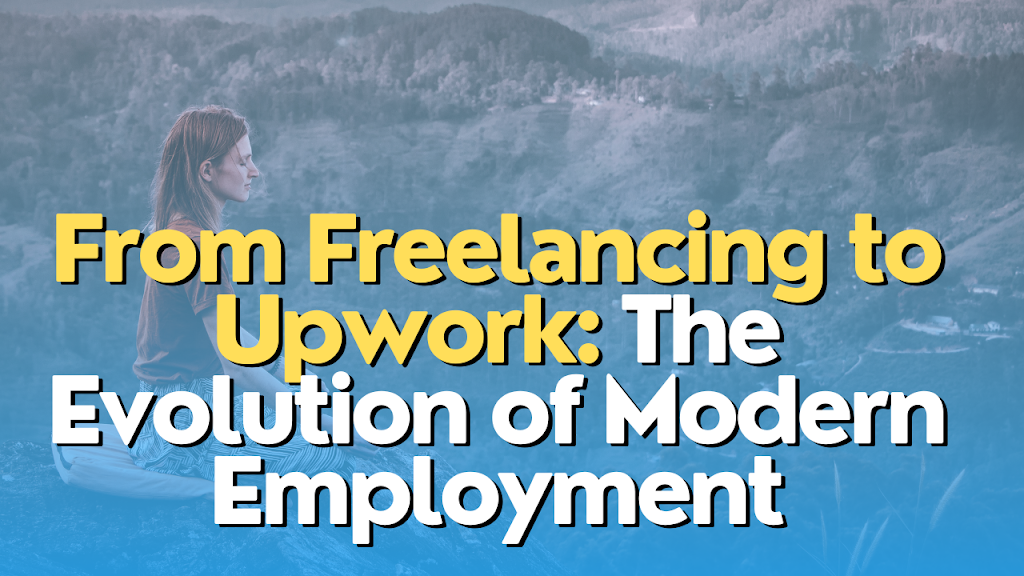Embark on a journey tracing the evolution of modern employment with our guide, ‘From Freelancing to Upwork: The Evolution of Modern Employment.’ In this exploration, we delve into the transformative shift from traditional freelancing to the dynamic opportunities presented by Upwork. Witness the evolution of how work has adapted to the digital age and discover the pivotal role Upwork plays in shaping the modern employment landscape. Join us as we navigate the transition, uncovering the keyphrase ‘From Freelancing to Upwork’ and understanding the significant changes in the way we work today.
Introduction
The nature of employment has undergone a remarkable transformation with the advent of freelancing, marking a paradigm shift in how individuals engage in work. In the modern workforce, freelancing has become more than just a side hustle—it has evolved into a full-fledged career path. This evolution is intricately linked with the rise of online platforms, and none have played a more significant role than Upwork.
Freelancing Defined
Freelancing refers to a work arrangement where individuals offer their services to clients on a project basis, typically outside the traditional employer-employee relationship. This flexible form of employment enables autonomy and control over one’s professional life.
Rise of Freelancing in the Modern Workforce
The surge in freelancing can be attributed to various factors, including technological advancements, a desire for work-life balance, and the globalization of the job market. As more professionals seek flexibility in their careers, freelancing has emerged as a viable and attractive option.
Importance of Platforms like Upwork
Upwork, a leading online freelancing platform, has played a pivotal role in shaping the landscape of modern employment. It connects businesses with skilled freelancers from around the world, facilitating a dynamic marketplace that benefits both parties.
Overview of the Evolution of Modern Employment
This blog post explores the journey from traditional freelancing to the prominence of Upwork, analyzing how these changes have shaped the way people work and highlighting the significance of adapting to this evolving employment landscape.

2. The Freelancing Landscape
Historical Perspective on Freelancing
Freelancing Before the Digital Age
Before the digital era, freelancing primarily existed in traditional fields such as writing, graphic design, and consulting. Freelancers operated locally, relying on personal networks and word of mouth for business. This limited scope changed with the rise of the internet.
Impact of Technology on Freelancing
The internet revolutionized freelancing by breaking down geographical barriers. Online platforms emerged, offering a global marketplace for freelancers to showcase their skills. Websites like Elance, oDesk, and eventually Upwork paved the way for a new era in freelancing.
Characteristics of Freelancing
Flexibility and Autonomy
One of the key attractions of freelancing is the flexibility it provides. Freelancers have the autonomy to choose their projects, set their schedules, and work from virtually anywhere. This level of freedom has been a driving force behind the growing popularity of freelancing.
Challenges and Opportunities
While freelancing offers flexibility, it also comes with challenges. Freelancers must navigate periods of uncertainty, manage their own finances, and continually seek new opportunities. However, the digital age has also brought forth unprecedented opportunities for networking, collaboration, and skill enhancement.
As we transition to the next section, we will explore how Upwork emerged as a transformative force in the freelancing landscape.
3. The Birth of Upwork
Introduction to Upwork
Upwork, founded in 2015 through the merger of Elance and oDesk, represents a milestone in the evolution of freelancing. This online platform transformed the way businesses and freelancers connect, offering a streamlined approach to project-based work.
Founding and Early Years
Upwork’s inception was rooted in the recognition of the need for a more centralized and efficient freelancing marketplace. Recognizing the potential of the gig economy, the founders sought to create a platform that would cater to the diverse needs of both freelancers and clients.
Upwork’s Role in Revolutionizing Freelance Work
Upwork introduced several groundbreaking features that revolutionized the freelancing landscape. The platform provided a user-friendly interface for freelancers to showcase their skills, bid on projects, and build a global clientele. For clients, Upwork offered a vast pool of talent, simplified hiring processes, and ensured payment security.
Upwork vs. Traditional Employment Models
Upwork’s model challenged traditional employment norms by offering a flexible and dynamic alternative. Unlike conventional 9-to-5 jobs, freelancers on Upwork could choose projects based on their expertise and availability. This shift marked a departure from the conventional employer-employee relationship, emphasizing project-based collaboration.
As we move forward, we will explore the profound impact Upwork has had on modern employment dynamics.
4. Upwork’s Impact on Modern Employment
How Upwork Works
Creating Profiles and Portfolios
Upwork empowers freelancers to build comprehensive profiles showcasing their skills, experience, and portfolio. This feature allows freelancers to market themselves effectively, making a compelling case for potential clients.
Bidding and Winning Projects
The bidding system on Upwork enables freelancers to express interest in projects posted by clients. This competitive process encourages freelancers to refine their proposals, highlighting their unique value propositions. Successful bids result in project awards, fostering a meritocratic environment.
Advantages of Using Upwork for Freelancers
Global Reach and Access to Diverse Opportunities
Upwork provides freelancers with a global platform to reach clients beyond their local networks. This expanded reach opens doors to diverse opportunities, allowing freelancers to work with clients from different industries and regions.
Flexibility and Work-Life Balance
Freelancers on Upwork enjoy the flexibility to set their own schedules and choose projects aligned with their expertise and interests. This flexibility contributes to a better work-life balance, a significant draw for professionals seeking autonomy in their careers.
Benefits for Employers on Upwork
Access to a Global Talent Pool
Upwork enables businesses to tap into a vast and diverse talent pool. Companies can find freelancers with specific skills, regardless of geographical constraints. This global marketplace fosters innovation and collaboration across borders.
Cost-Effective Solutions
Employers often find cost-effective solutions on Upwork, as they can choose from freelancers with varying rates based on experience and expertise. This flexibility in pricing allows businesses to optimize their budgets while still accessing high-quality services.
Challenges and Criticisms of Upwork
Competition and Pricing Pressures
The open nature of Upwork’s platform means freelancers face stiff competition. This competition can lead to pricing pressures, as freelancers may need to lower rates to remain competitive, impacting their income.
Concerns About Quality Control
Some clients express concerns about the quality of work on Upwork. To address this, freelancers must focus on building strong profiles, showcasing their skills, and delivering high-quality work to establish credibility.
As we transition, we will explore Upwork’s pivotal role in shaping the broader gig economy.

5. Upwork’s Role in Shaping the Gig Economy
Defining the Gig Economy
The gig economy, characterized by short-term and flexible work arrangements, has experienced significant growth in recent years. Upwork has been a driving force behind the expansion of this dynamic employment model, facilitating connections between businesses and freelancers in various industries.
Upwork as a Catalyst for the Gig Economy
Case Studies of Successful Upwork Freelancers
Numerous freelancers have leveraged Upwork to build successful careers. Case studies highlight individuals who transitioned from traditional employment to thriving in the gig economy through Upwork. These success stories underscore the platform’s impact on reshaping career trajectories.
Trends in Gig Economy Employment
The gig economy has witnessed evolving trends, influenced in part by platforms like Upwork. Remote work, project-based collaborations, and the rise of independent professionals are notable shifts brought about by the gig economy. Upwork continues to be at the forefront of these transformative changes.
As we move forward, we will explore the significance of skill development within the Upwork ecosystem.
6. Skill Development and Upwork
Importance of Skills in the Upwork Marketplace
Upwork operates in a competitive environment where freelancers with diverse skills vie for projects. Developing and showcasing in-demand skills is crucial for success on the platform.
Upwork as a Platform for Continuous Learning
Opportunities for Skill Enhancement
Upwork provides freelancers with a unique learning environment. To stay competitive, freelancers often engage in continuous skill development. The platform offers opportunities to diversify expertise and adapt to evolving market demands.
Upwork’s Certification Programs
Recognizing the importance of skills, Upwork introduced certification programs. These programs allow freelancers to validate their proficiency in specific areas, providing clients with assurance about the quality of their work.
Developing Marketable Skills for Upwork Success
Identifying In-Demand Skills
Freelancers should stay informed about trends and identify skills in demand on Upwork. This proactive approach positions them as valuable contributors to projects sought after by clients.
Building a Comprehensive Portfolio
A well-curated portfolio is a freelancer’s showcase on Upwork. Including diverse and high-quality samples of work enhances a freelancer’s profile, attracting attention from potential clients.
As we progress, we will explore the future trends shaping freelancing and Upwork’s response to market changes.
7. Future Trends in Freelancing and Upwork
Emerging Technologies and Their Impact on Upwork
Integration of AI and Automation
The future of freelancing on platforms like Upwork is likely to see increased integration of artificial intelligence (AI) and automation. This can streamline repetitive tasks, allowing freelancers to focus on high-value creative and strategic work.
Blockchain for Payment Security
Blockchain technology may play a significant role in ensuring secure and transparent payment transactions on freelancing platforms. This innovation could address concerns related to payment disputes and enhance the overall trustworthiness of the gig economy.
Upwork’s Response to Market Changes
Continuous Platform Innovation
To stay ahead in a rapidly evolving landscape, Upwork is expected to continue innovating its platform. This may involve introducing new features, improving user experience, and adapting to emerging industry trends.
Collaboration with Emerging Industries
Upwork is likely to forge partnerships with emerging industries that rely heavily on freelancers. By aligning with sectors at the forefront of technological advancements, Upwork can ensure its relevance and significance in the changing job market.
As we transition, let’s explore success stories of freelancers who have thrived on the Upwork platform.
8. Success Stories
Profiles of Successful Freelancers on Upwork
1. Graphic Design Maven: Jane Doe
- Background: Jane, a graphic designer, transitioned from traditional employment to freelancing on Upwork.
- Upwork Success: She built a robust profile showcasing her design portfolio, securing projects from global clients impressed by her creativity.
- Quote: “Upwork transformed my career. I now collaborate with clients worldwide and enjoy the freedom to choose projects that align with my passion.”
2. Digital Marketing Guru: John Smith
- Background: John, an experienced digital marketer, leveraged Upwork to diversify his client base.
- Upwork Success: Through strategic bidding and consistent delivery, John secured long-term projects, establishing himself as an authority in digital marketing.
- Quote: “Upwork not only expanded my client network but also pushed me to enhance my skills continuously. It’s a dynamic marketplace that rewards dedication.”
Lessons Learned from Upwork Success Stories
1. Showcase Your Best Work
- Tip: Craft a compelling portfolio that highlights your strengths and demonstrates the quality of your work.
2. Be Proactive in Bidding
- Tip: Actively bid on projects relevant to your skills. Craft personalized proposals showcasing your understanding of the client’s needs.
3. Prioritize Client Relationships
- Tip: Building strong relationships with clients leads to repeat business and positive reviews, crucial for long-term success on Upwork.
As we near the end, we will summarize the key insights and offer a glimpse into the future of freelancing and Upwork.
9. Conclusion
In the dynamic landscape of modern employment, the journey from traditional freelancing to the prominence of Upwork reflects the profound shifts in how individuals approach work. The rise of freelancing, fueled by the flexibility it offers, has been further propelled by online platforms like Upwork, which serve as bridges connecting skilled freelancers with businesses worldwide.
Recap of the Evolution of Modern Employment
From the early days of freelancing, confined to local networks, to the global reach facilitated by Upwork, the employment landscape has transformed. The gig economy, shaped by platforms like Upwork, has ushered in an era of flexibility, autonomy, and diverse opportunities.
The Continuing Impact of Upwork on the Freelance Landscape
Upwork’s impact on modern employment is evident in its role as a catalyst for the gig economy. The platform’s user-friendly interface, innovative features, and commitment to continuous improvement have made it a cornerstone for freelancers and businesses seeking dynamic collaborations.
Final Thoughts on the Future of Freelancing and Upwork
As we look ahead, emerging technologies, such as AI and blockchain, are poised to influence the future of freelancing. Upwork, recognizing the need for adaptability, is likely to continue innovating, ensuring it remains a vital player in the evolving job market.
In conclusion, the evolution of modern employment from freelancing to Upwork underscores the importance of staying adaptable and embracing the opportunities presented by the gig economy. Whether you’re a freelancer seeking diverse projects or a business exploring cost-effective and skilled solutions, Upwork stands as a testament to the transformative power of online platforms in reshaping how we work.
Thank you for joining us on this exploration of the evolution of modern employment. We hope this journey has provided valuable insights into the dynamic world of freelancing and the integral role played by Upwork.
